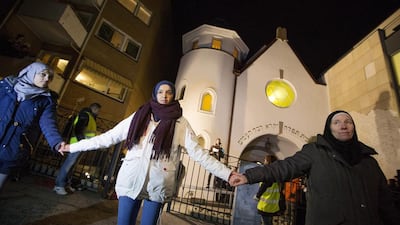In Norway, after anti-Semitic violence in neighbouring Denmark, hundreds of Muslims formed a ring of peace around a synagogue, protecting it and the worshippers inside during their prayers. It was a good illustration of how religion can be a force for good in the world.
I’m told that religion promotes backwardness and exclusionary thinking and that it allows, or worse, necessitates violence. After the Charlie Hebdo attacks and other incidents in other parts of the world, the chorus of naysayers has grown louder.
They ask why Muslims can’t take a joke or what is it about religion that makes people capable of violence. But these puerile questions try to force us into an “us and them” mentality.
Violence, although perhaps intrinsic to the human condition, can be overcome. On that January day in Paris, the world was focused on one act of violence in the Charlie Hebdo offices but billions of religiously inclined human beings went about their business and didn’t kill, maim or disrespect anyone.
On that day, a few million French Muslims got out of bed and started their day as French Muslims do, with coffee and pastries. They went to work in accountancy firms, butcher shops, banks, government offices and police departments. One Muslim police officer, Ahmed Merabet, was murdered while trying to stop the attackers.
Meanwhile, in Sierra Leone, churches and mosques collaborated on anti-malaria education initiatives. In American cities, interfaith food pantries, some many decades old, continued serving meals to disadvantaged citizens. Around the world, people of all faiths united to push for environmental protection.
And those are just the interesting examples. Plenty of mundane things happened on that January day.
In Abu Dhabi, a Catholic traveller on a long layover was given a tour of the Sheikh Zayed Mosque (and, unlike Rihanna, didn’t pose for any photos at all).
In Ohio, a loudly antagonistic atheist teenager had an awkward family meal with his grandparents, one of whom is a Baptist preacher.
Countless prayers were offered for countless reasons.
Violence and hatred are not the norm for our fragile world. Far from it. We pay attention to these things because doing so keeps us alive. We worry about the dangerous terrorists overseas instead of the loving neighbours we have at home.
I’m part of a generation of young people that is doing everything it can to build bridges between faiths and be peace makers in its community and abroad.
We learn from history that some of our most powerful speakers and activists were people of deep religious conviction. They were faith heroes, if you will: Martin Luther King Jr, Mahatma Gandhi, Badshah Khan and Abraham Joshua Heschel.
We’re convinced that violence and hatred are not inescapable parts of a religiously diverse world. We believe that pluralism and positive engagement among people of all faiths leads to a planet where we are better together – a planet where peace, not violence, dominates the headlines in a truer reflection of reality.
That reflection is what I see in religion – an abiding hope of what can be. For all of the gross injustice and hatred and death, we have all been called into action by something greater than ourselves. No matter where we are or who we are, we all have a responsibility to further improve the vision that our religious traditions call us to.
Tasked with working across religious lines, we will make interfaith cooperation a social norm worldwide. Expect us. In fact, expect yourselves.
Tim Brauhn is communications manager at Islamic Networks Group, which counters prejudice against American Muslims. He was an inaugural member of the Faiths Act Fellowship, an international programme for interfaith leaders

